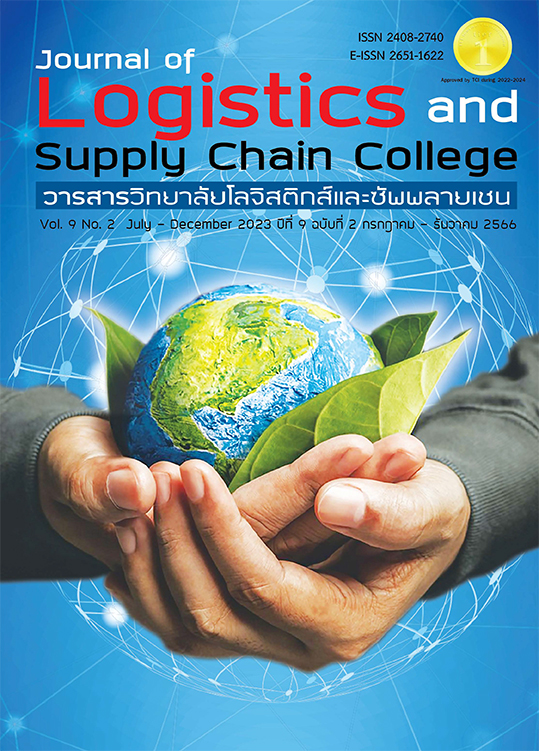Muslim Friendly Tourism Needs that Influence Muslim Tourists’ Travel Intention to Non-Muslim Tourism Destinations
DOI:
https://doi.org/10.53848/jlscc.v9i2.262793Keywords:
Muslim friendly tourism, Tourist needs, Non-Muslim tourism destinationsAbstract
This research aims to 1) study Muslim tourist needs for Muslim friendly tourism, 2) investigate the factors of Muslim tourist needs that influence travel intention to non-Muslim tourism destinations (Non-MTD), and 3) examine the influence of Muslim tourists’ domicile province as a moderator. Data was collected from 723 people living in fourteen provinces in Southern Thailand using a questionnaire. The quantitative data was analyzed using descriptive statistics, including frequencies, percentages, means, and standard deviations and using inference statistics with multiple regression analysis. Research results revealed that Muslim tourists had a high level of need for Muslim friendly tourism overall. Results from the multiple regression analysis revealed that Muslim friendly tourism had a statistically significant influence on travel intention to non-Muslim tourism destinations. Additionally, the results also confirmed that the tourists’ province of domicile province influenced their decisions as a moderator. In regard to recommendations, Muslim friendly tourism is an important factor for potential tourism development related to the carrying capacity of Muslim tourists in the future which Muslim friendly tourism might be a part of tourism business plans for enhancing business growth opportunities.
References
สำนักงานสถิติแห่งชาติ. (2561). สถิติศาสนา ศิลปะ วัฒนธรรม. ค้นเมื่อ 10 ตุลาคม 2564, จาก: http://statbbi.nso.go.th/staticreport/page/sector/th/04.aspx.
สถาบันฮาลาลมหาวิทยาลัยสงขลานครินทร์. (2554). ธุรกิจสปาฮาลาล. ค้นเมื่อ 22 ตุลาคม 2564, จาก: http://dmhost2.psu.ac.th/~halinst/th/knowledge-th/.
Aji, H. M., Muslichah, I., & Seftyono, C. (2020). The determinants of Muslim travellers intention to visit non-Islamic countries: a halal tourism implication. Journal of Islamic Marketing, 12(8), 1553-1576.
Carlson, K. D., & Herdman, A. O. (2012). Understanding the impact of convergent validity on research results. Organizational Research Methods, 15(1), 17-32.
Choe, Y., Kim, H., & Joun, H.-J. (2019). Differences in tourist behaviors across the seasons: The case of Northern Indiana. Sustainability, 11(16), 4351.
Cuesta-Valiño, P., Bolifa, F., & Núñez-Barriopedro, E. (2020). Sustainable, smart and Muslimfriendly tourist destinations. Sustainability, 12(5), 1778.
Hanafiah, M. H., & Hamdan, N. A. A. (2021). Determinants of Muslim travellers Halal food consumption attitude and behavioural intentions. Journal of Islamic Marketing, 12(6), 1197-1218.
Hanafiah, M. H., Maek, A. A. A. A., & Zahari, M. S. M. (2021). Muslim Tourist Behaviour and Intention to Revisit non-Muslim Countries: The Role of Muslim-Friendly Tourism (MFT) Attributes. International Journal of Religious Tourism and Pilgrimage, 9(1), 165-177.
Jeaheng, Y., Al-Ansi, A., & Han, H. (2019). Halal-friendly hotels: Impact of halal-friendly attributes on guest purchase behaviors in the Thailand hotel industry. Journal of Travel & Tourism Marketing, 36(6), 729-746.
Jermsittiparsert, K., & Chankoson, T. (2019). Behavior of tourism industry under the situation of environmental threats and carbon emission: Time series analysis from Thailand. International Journal of Energy Economics and Policy, 9(6), 366-372.
Kamassi, A., Manaf, N. H. A., & Omar, A. (2020). The need of international Islamic standards for medical tourism providers: a Malaysian experience. Journal of Islamic Marketing, 12(1), 113-123.
Liu, Y.-C., Li, I.-J., Yen, S.-Y., & Sher, P. J. (2018). What makes Muslim friendly tourism? An empirical study on destination image, tourist attitude and travel intention. Advances in Management and Applied Economics, 8(5), 27-43.
Musa, A., Halim, H., Khalidin, B., & Ibrahim, A. (2021). What Determines Muslim-Friendly Tourism in Aceh. Jurnal Iqtishadia, 14(1), 81-106.
Nawawi, M. S. A. M., Abu-Hussin, M. F., Faid, M. S., Pauzi, N., Man, S., & Sabri, N. M. (2019). The emergence of halal food industry in non Muslim countries: a case study of Thailand. Journal of Islamic Marketing, 11(4), 917-931.
Putra, M. F. S., & Tucunan, K. P. (2021). The Concept of Halal Tourism and The Fulfillment of Muslim Tourist Needs in Halal Tourism. Halal Research Journal, 1(2), 56-62.
Rasul, T. (2019). The trends, opportunities and challenges of halal tourism: A systematic literature review. Tourism recreation research, 44(4), 434-450.
Said, M. F., Adham, K. A., Muhamad, N. S. a., & Sulaiman, S. (2020). Exploring halal tourism in Muslim-minority countries: Muslim travellers’ needs and concerns. Journal of Islamic Marketing, 13(4), 824-842.
Septianto, F., Chiew, T. M., & Thai, N. T. (2020). The congruence effect between product emotional appeal and country-based emotion: The moderating role of countryof-origin. Journal of Retailing and Consumer Services, 52, 101916.
Sudarsono, H., Shidiqie, J. S. A., & Tumewang, Y. K. (2021). The Impact of Religiosity and Knowledge on the Intention of Young Muslim Generation toward Halal Tourism in Indonesia. Tourism and hospitality management, 27(2), 255-272.
Suhartanto, D., Dean, D., Wibisono, N., Astor, Y., Muflih, M., Kartikasari, A., Hardiyanto, N. (2021). Tourist experience in Halal tourism: what leads to loyalty. Current Issues in Tourism, 24(14), 1976-1990.
Taherdoost, H. (2016). Validity and reliability of the research instrument; how to test the validation of a questionnaire/survey in a rsearch. International Journal of Academic Research in Management, 5(3), 28-36.
Ulfy, M. A., Haque, A., Karim, M. W., Hossin, M. S., & Huda, M. (2021). Tourists Behavioral Intention to Visit Halal Tourism Destination: An Empirical Study on Muslim Tourists in Malaysia. International Fellowship Journal of Interdisciplinary Research, 1(1), 1-18.
Wannasupchue, W., Othman, M., Abidin, U., Ishak, F., & Mohamad, S. F. (2019). Current trends and opportunities for halal restaurants in Thailand: A conceptual framework. International Journal of Academic Research in Business and Social Sciences, 9(1), 235-247.
Yamane, T. (1973). Statistics an Introductory Analysis. 3rd Edition. New York: Harper and Row.
Yen, H.-P., Chang, J.-W., Ho, K.-C., & Hung, H.-K. (2022). Foreign Muslim Workers’ Perspectives of the Basic Needs of Muslim-Friendly Tourist Services: An Empirical Analysis of a Non-Muslim Destination. Security and Communication Networks, 2022, 1-17.



